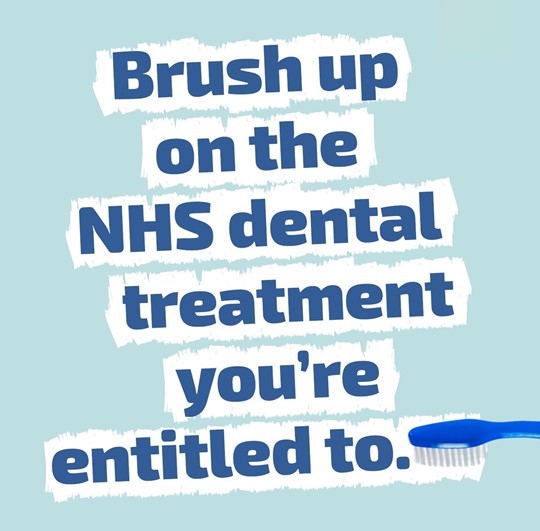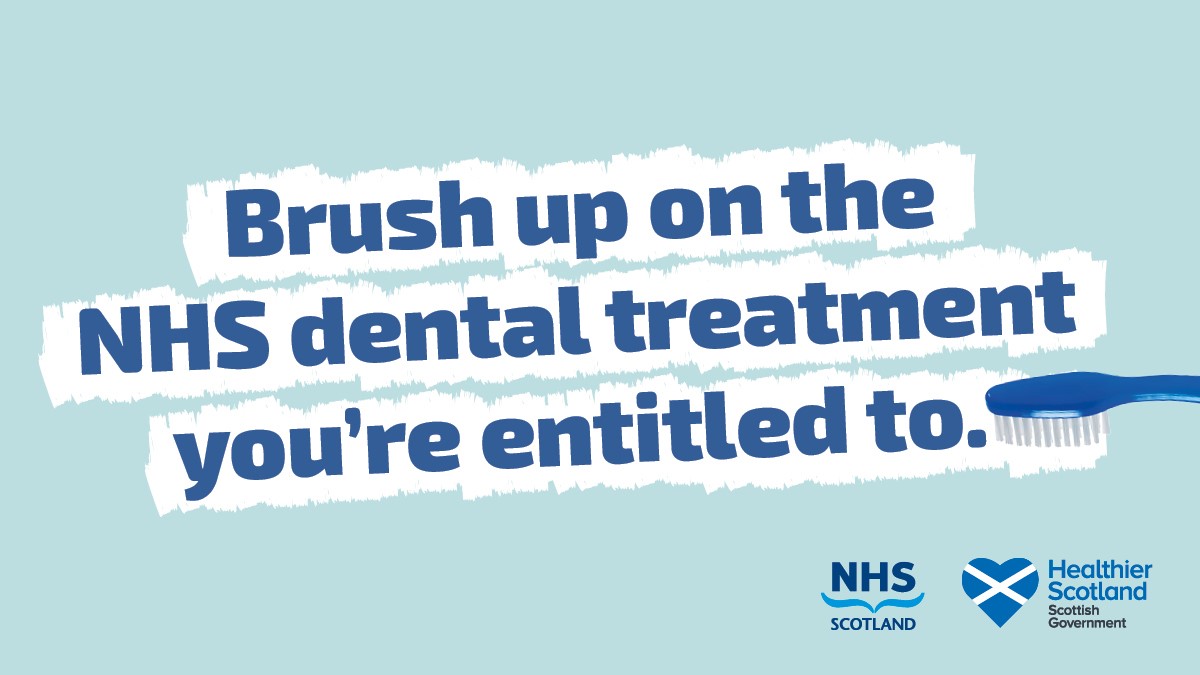Changes to NHS dental treatment from November 2023
On this page
You may have heard about changes to NHS dental care and treatment in Scotland. What isn’t changing is that you can still get a comprehensive range of dental care and treatments through the NHS. And for some people, treatment could be completely free.
NHS dental reform has been introduced by the Scottish Government in a continued effort to support the oral health needs of every patient in Scotland. Patients are still entitled to a comprehensive range of treatments through the NHS.

Changes to dental treatment and care
- General Dental Service check-ups will change from every six months to every 12 months. However, dentists can tailor recalls based on patients' individual oral health needs.
- The maximum amount that will be charged to an individual per treatment plan will remain capped at £384 or 80% of costs.
- Some patients may be eligible to receive help towards healthcare costs. And some still qualify for free dental care.
Patient charges
From 1 November 2023, if you pay for your NHS dental treatment you may notice an increase in treatment charges. These increases are necessary to ensure that dentists are able to continue to provide NHS dental services and reflect the increase in cost of delivering the care required for patients. Everyone in Scotland is entitled to free NHS dental examinations (including review examinations). For some patients all treatment is completely free.
Following a dental examination, the dentist will advise you of any treatment you require and the likely cost. They must also provide an itemised account, if requested.
As before, NHS patients who pay for their treatment pay 80% of the treatment costs. This continues to be capped at a maximum of £384 per course of treatment. Any costs over this maximum continues to be fully subsidised by the NHS. You will never pay more than £384 per course of treatment. The vast majority of patients will pay much less than this cost.
A dentist can ask for payment in advance. They can also charge a patient if they fail to attend for an appointment without giving due notice.
Who is entitled to free treatment on the NHS?
NHS treatment is free for:
- everyone aged under 26
- people who are pregnant or have given birth in the last 12 months
- those with certificated exemption from patient charge because of income or receipt of certain benefits
If you are exempt from patient charges during a course of treatment, tell the dentist and ensure that you bring the evidence with you. Around 40% of all patients are exempt from paying a contribution towards the cost of their NHS dental care.
NHS Low Income Scheme
Others may be entitled to dental treatment at a reduced cost through the NHS Low Income Scheme (LIS). The LIS helps towards some or all of the cost of NHS patient charges for those who are not automatically entitled to free treatment, who may have difficulty in paying. Help under the scheme is income-related and based on an assessment of each person’s ability to pay.
Read a help with health costs guide at NHS inform to find out if you are eligible for free or reduced cost NHS dental treatment.
What is prior approval?
Your dentist may inform you that they have to apply for prior approval before your treatment can be started. Dentists are required to seek approval from the NHS National Services Scotland (NSS) Practitioner Services, for certain treatments and/or treatment plans of high value. This process may take a little time and delay your treatment slightly.
Important: More information on treatment costs

Read more about dental treatment costs at NHS inform, including patient charges for common treatment items.
Preventive care programme
From 1 November 2023, you may notice that there are some changes to the way your NHS dental treatment is delivered. Your dentist will determine how often you should have a NHS dental examination based on your treatment needs to ensure the best possible care. This may range from less than 6 months to every 2 years. If you are seen less often than 12 months then this is a sign of good oral health. It is important that you attend when recommended and don’t miss appointments.
Adults will continue to be offered a treatment plan which includes an extensive clinical examination. You’ll then receive any further treatments to manage and improve your oral health.
During your NHS dental examination you may be asked about any changes to your medical history, medication or any new allergies. You’ll also be asked about any changes you have noticed such as lumps, bumps or ulcers or if you are having any specific problems. You may also be asked if you smoke or drink alcohol, and if so, how much.
After they’ve established how your general health is, the dental team will:
- examine your mouth including your teeth, gums and tongue
- advise you on how you can keep your mouth healthy
- explain any treatments you may need - if you do need dental treatment they’ll advise you of your options, including what treatments can be carried out on the NHS
- explain any treatment cost
During periods of time between dental examinations, if you have concerns about your oral health, particularly around any lumps, bumps or ulcers in the lining of your mouth, then you may wish to contact your dentist at the earliest opportunity and they will be able to see you sooner.
Important: Understanding your dental treatment

Read more about understanding your dental treatment at NHS inform, including:
- What do you receive as an NHS patient?
- Childsmile programme
- Preventive care programme for adults
- Your treatment plan

Dental services
-
Getting help with a dental problem
Are you worried about persistent mouth, tooth or gum problems?
-
Registering with a dental practice
Registration with a dentist for NHS services in the NHS Highland area.
-
Dental practices
Dentists (dental practitioners) in NHS Highland.
-
Dental helpline and emergency dental treatment
Contact phone numbers for the dental helpline and out-of-hours emergency dental services.
-
Deregistered NHS dental patients
Frequently asked questions for deregistered NHS dental patients.
-
Changes to NHS dental treatment from November 2023
You may have heard about changes to NHS dental care and treatment in Scotland. What isn’t changing is that you can st...
-
More information about dental care and treatment
More useful guidance from the NHS, Mygov.scot and dental organisations.
